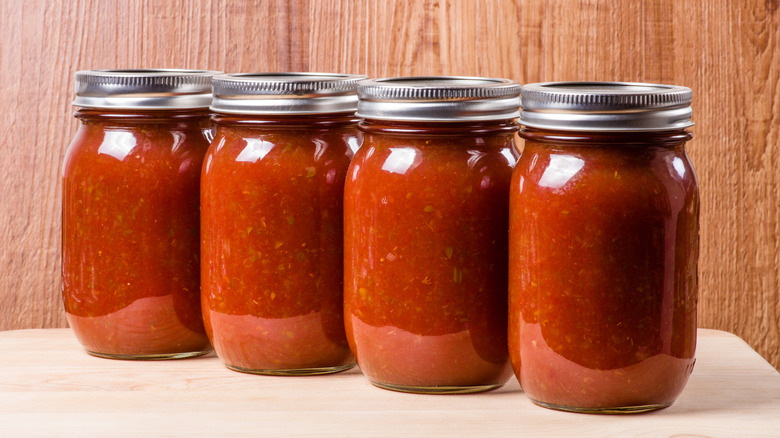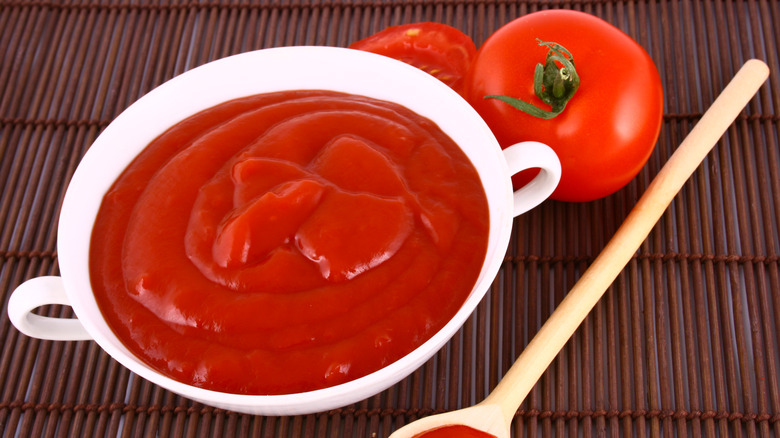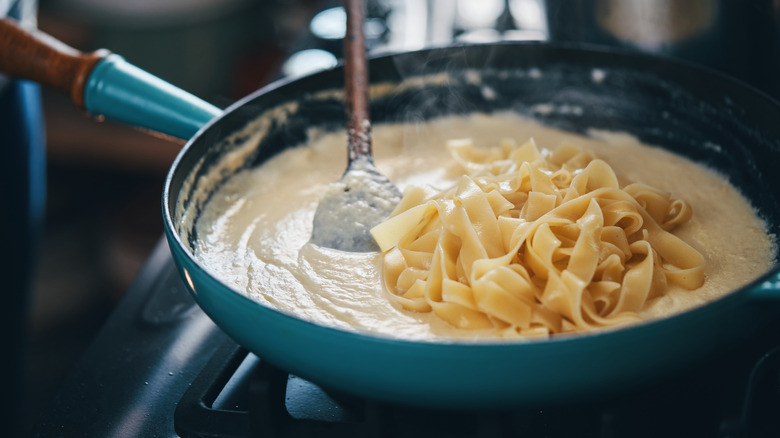How Long An Open Jar Of Spaghetti Sauce Lasts In The Fridge
When rummaging through your fridge in hopes of making a meal from whatever's sitting around, it's all too common to find half-empty jars and packages that you forgot about. Spaghetti sauce is a frequent victim, often left to languish in the fridge after being used once for a pasta dinner a week ago (or was it two?). In a bid to avoid food waste, you might think of pouring that leftover sauce into a vegetarian lasagne recipe or seafood stew, but stop and think first. Opened pasta sauce can only sit in the refrigerator for so long before it becomes bacteria-ridden and dangerous to eat.
Although the exact shelf life of spaghetti sauce will depend on its ingredients, unopened jars will generally stay fresh for a year beyond their best-by dates, when stored in a cool, dark pantry. Once opened, leftovers will last between five days to two weeks in the fridge, with the exact time span also depending on the type of sauce. For example, tomato-based sauces can stay fresh for five to 10 days, while sauces such as Alfredo will remain edible for a week at maximum. Oil-based sauces, like garlic-infused olive oil, can last for up to two weeks.
Notably, these guidelines apply to store-bought sauces that contain preservatives. Homemade tomato sauces, or sauces that you purchase freshly-made from the farmer's market, can spoil in as quickly as three days when stored in the fridge.
Store pasta sauce properly to extend its shelf life
Store-bought, tomato-based sauces are often processed thoroughly to prolong their shelf life, and contain plenty of acid from the tomatoes. These factors make them more resistant to bacterial growth, which is why unopened jars can often be stored in the pantry. Canned tomato sauce should definitely be kept out of the refrigerator before opening, as the metal cans tend to react with the humidity of the fridge, resulting in rust or corrosion.
Once opened, the best way to prolong spaghetti sauce's shelf life is to store it in the fridge in an airtight vessel. Seal it tightly in a glass jar (the jar it was sold in can work, so long as it's not cracked or compromised), or move it to an airtight container if it came in a can. Your fridge should be set at a temperature of 40 degrees Fahrenheit or below. Be sure to use clean utensils when transferring the sauce to a container, and when scooping it out for use in your recipes. Lingering germs or food particles can infiltrate the sauce and hasten spoilage.
Alternatively, freeze the sauce to extend its shelf life to as long as six months. A good way to do so is to portion out the leftovers into single servings in separate freezer-safe containers. This way, you can take out as much as you need, rather than having to defrost and refreeze an entire block of sauce.
Signs that your spaghetti sauce is past its prime
It's good to know how long spaghetti sauce generally last, but these time frames are just guidelines. Several factors can influence how quickly a sauce spoils, so always inspect your jar to see if it's still good. Mold is an obvious sign of a sauce gone bad, but it can be awfully hard to notice in tomato-based sauces, especially ones with lumps of meat or flakes of herbs. Mold can disguise itself as either of these additions, so try relying on your nose instead.
If you notice an oddly sour and/or pungent smell wafting from a jar of sauce, it's time to toss it out. Sauces that don't contain any preservatives will also become more pale as they lose their color. Spoilage is more noticeable in cream-based sauces such as Alfredo or carbonara, as mold is easier to see in the light-colored mixture. If a creamy sauce splits into a curdled consistency in the fridge, it might still be fine to eat after a good mixing. Even so, this is a sign that it's getting older and you should use it up ASAP, perhaps in a leftover Alfredo dip.
If your sauce shows none of these red flags, but you're still worried that it's a bit old, just reheat it to at least 145 degrees Fahrenheit. No matter the age of your leftover sauce, this should always be done to kill off any bacteria and make it safe to enjoy.



